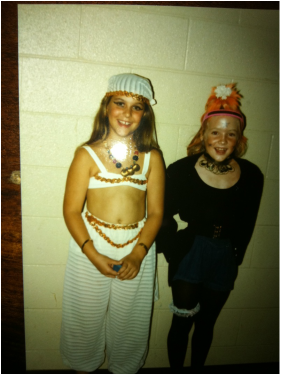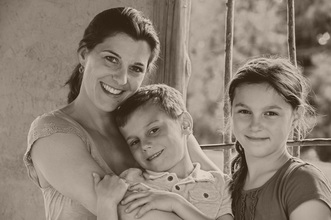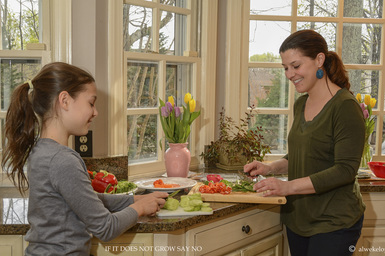Author Kerry WekeloThrough articles, books, and programs, author Kerry Wekelo advocates for holistic health and intentional well-being for children and adults. She is also the mother of two amazing kids, the founder and visionary of Zendoway and Managing Director of Human Resources and Operations for Actualize Consulting, where she spearheaded and runs a successful wellness program. With If It Does Not Grow – Say No, Kerry adds healthy, mindful eating to the list of important life lessons children learn from her books. Look for Audrey’s Journey, Kerry’s children’s book series focused on living with compassion and joy, and the Pile of Smile Activity Book to give away free to children undergoing cancer treatment. Visit Kerry's personal website or email at [email protected] for bulk orders or to schedule her for an event or speaking engagment. To purchase via Amazon, click here.
|
Introduction to the BookKids and healthy foods tend to mix like oil and water, but what happens when you add fun and adventure? Suddenly kids are interested in their fruits and vegetables, curious about their health and eating, and even willing to try some healthy foods they usually consider “ewwwww!” In our society today, we tend to make food the enemy. If It Does Not Grow – Say No is one way for kids to make food – healthy food – a friend again. Activities include drawing, writing, cooking, and other puzzles that help kids learn about and enjoy healthy eating. Healthy eating is not just about what we eat, but how and why we eat it. Use this activity book to help teach kids (and grown-ups!) to slow down for mealtimes, to pay more attention to fruits and veggies, and to make conscious choices for their health. These are lessons that naturally spreadinto other areas of their lives, making them stronger, healthier, happier kids.
|
Why to Educate and Empower Kids Towards Healthy Eating
 Kerry on the left with childhood friend.
Kerry on the left with childhood friend.
I grew up feeling I was the pretty yet overweight girl. I always knew I was pretty, since everyone told me so, and I always thought I was overweight because it was so often a topic of adult conversation surrounding my being.
I still have vividly clear memories of each reference to my weight, starting with overhearing the concerned conversations of “it is just baby fat, hopefully she will grow out of it – she is such a beautiful girl.” But I really started feeling the pain one night at a dinner at my grandmother’s house. I can still hear her saying, “Girls like you should not be eating any bread or rice.” I lived close by, so I ran down the lane to my own house, crying in shame and anger because everyone else was allowed to have bread.
I was young and impressionable, feeling each comment so deeply: “Honey, with your butt, you should never wear white,” and “Good thing you are pretty and nice, so your weight will not get in the way of dating.” As if that was not enough, my basketball coach announced to the entire team after one summer that I had put on too much weight as if I were not self-conscious and aware of that fact!
By middle school, I was put on a running/walking plan and restricted portion sizes. For ice cream, my favorite treat, I was given a 1/2 cup measuring cup, and I would stuff and stuff that cup to get as much ice cream in as possible. The hurtful part was that I was the only one who had to be on this plan. My brother was allowed to eat as much as he wanted, so I felt painfully singled out.
We all remember the struggles of our teenage years. I would go to sleepovers and watch the girls eat sugar and other junk and never gain any weight, while I would eat one cookie and the pounds would pack on. One time, I finally got to indulge in an entire bowl of sugary cereal, then got so sick I could not even go to school.
Surprisingly, pictures from those early years actually show that I have never been more than 10-20 pounds overweight (from my personal feel good weight). As a child, I was always in shape as I grew up on a farm, played sports, ran, and walked and walked. I was healthy and strong, yet my overwhelming perception was that I was big -- or at least bigger than my friends. I was actually just more visibly muscular, and really not that different from everyone else. The constant focus and microscope had torn down my self-image.
On the positive side, at an early age, I felt how too much sugar or poor food choices impacted me physically from a weight and digestion perspective. My slower metabolism provided for early life lessons which I still value today. Now as I am in my 40’s, I am not struggling with the same new issues my friends have with their metabolism slowing down. I have dealt with a slow metabolism my entire life, and simply continue my maintenance plan as usual.
I share this story because it is WHY I am so passionate about educating and empowering kids towards healthy eating. To this day, I have to constantly pivot my thoughts about my self-image, reminding myself that I am healthy and strong as I always have been.
Now, my work is to educate as many kids, parents, and teachers about HOW important it is to tell the WHY behind healthy eating. It is about empowering kids by allowing them to make their own choices, and guiding them in noticing and responding to feelings in their body.
My approach is about curiosity, not demands. It’s about “How does it taste? How does it feel? Did you like it?” versus “You have to eat a plate of broccoli.” I created an activity book, If It Does Not Grow: Say No – Eatable Activities for Kids, as a tool for parents and teachers to work with their children using this positive approach. Since I have begun to use the book in group settings, I’ve started also sharing supplemental activities that help you easily expand on the pages in the book.
Eating is a life journey, so the book is simply a facilitation tool to start the discussion toward empowering you and your kids.
I still have vividly clear memories of each reference to my weight, starting with overhearing the concerned conversations of “it is just baby fat, hopefully she will grow out of it – she is such a beautiful girl.” But I really started feeling the pain one night at a dinner at my grandmother’s house. I can still hear her saying, “Girls like you should not be eating any bread or rice.” I lived close by, so I ran down the lane to my own house, crying in shame and anger because everyone else was allowed to have bread.
I was young and impressionable, feeling each comment so deeply: “Honey, with your butt, you should never wear white,” and “Good thing you are pretty and nice, so your weight will not get in the way of dating.” As if that was not enough, my basketball coach announced to the entire team after one summer that I had put on too much weight as if I were not self-conscious and aware of that fact!
By middle school, I was put on a running/walking plan and restricted portion sizes. For ice cream, my favorite treat, I was given a 1/2 cup measuring cup, and I would stuff and stuff that cup to get as much ice cream in as possible. The hurtful part was that I was the only one who had to be on this plan. My brother was allowed to eat as much as he wanted, so I felt painfully singled out.
We all remember the struggles of our teenage years. I would go to sleepovers and watch the girls eat sugar and other junk and never gain any weight, while I would eat one cookie and the pounds would pack on. One time, I finally got to indulge in an entire bowl of sugary cereal, then got so sick I could not even go to school.
Surprisingly, pictures from those early years actually show that I have never been more than 10-20 pounds overweight (from my personal feel good weight). As a child, I was always in shape as I grew up on a farm, played sports, ran, and walked and walked. I was healthy and strong, yet my overwhelming perception was that I was big -- or at least bigger than my friends. I was actually just more visibly muscular, and really not that different from everyone else. The constant focus and microscope had torn down my self-image.
On the positive side, at an early age, I felt how too much sugar or poor food choices impacted me physically from a weight and digestion perspective. My slower metabolism provided for early life lessons which I still value today. Now as I am in my 40’s, I am not struggling with the same new issues my friends have with their metabolism slowing down. I have dealt with a slow metabolism my entire life, and simply continue my maintenance plan as usual.
I share this story because it is WHY I am so passionate about educating and empowering kids towards healthy eating. To this day, I have to constantly pivot my thoughts about my self-image, reminding myself that I am healthy and strong as I always have been.
Now, my work is to educate as many kids, parents, and teachers about HOW important it is to tell the WHY behind healthy eating. It is about empowering kids by allowing them to make their own choices, and guiding them in noticing and responding to feelings in their body.
My approach is about curiosity, not demands. It’s about “How does it taste? How does it feel? Did you like it?” versus “You have to eat a plate of broccoli.” I created an activity book, If It Does Not Grow: Say No – Eatable Activities for Kids, as a tool for parents and teachers to work with their children using this positive approach. Since I have begun to use the book in group settings, I’ve started also sharing supplemental activities that help you easily expand on the pages in the book.
Eating is a life journey, so the book is simply a facilitation tool to start the discussion toward empowering you and your kids.

